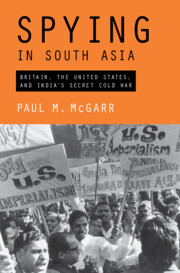Book contents
- Spying in South Asia
- Spying in South Asia
- Copyright page
- Contents
- Figures
- Acknowledgements
- A Note on Place Names
- Abbreviations
- Introduction
- 1 Transfer of Power: British Intelligence and the End of Empire in South Asia
- 2 Silent Partners: Britain, India, and Early Cold War Intelligence Liaison
- 3 India’s Rasputin: V. K. Krishna Menon and the Spectre of Indian Communism
- 4 Quiet Americans: The CIA and the Onset of the Cold War in South Asia
- 5 Confronting China: The Sino-Indian War and Collaborative Covert Action
- 6 Peddling Propaganda: The Information Research Department and India
- 7 From Russia with Love: Dissidents and Defectors in Cold War India
- 8 The Foreign Hand: Indira Gandhi and the Politics of Intelligence
- 9 Battle of the Books: Daniel Patrick Moynihan, Seymour Hersh, and India’s CIA ‘Agents’
- 10 Indian Intelligence and the End of the Cold War
- Conclusion
- Notes
- Bibliography
- Index
7 - From Russia with Love: Dissidents and Defectors in Cold War India
Published online by Cambridge University Press: 12 September 2024
- Spying in South Asia
- Spying in South Asia
- Copyright page
- Contents
- Figures
- Acknowledgements
- A Note on Place Names
- Abbreviations
- Introduction
- 1 Transfer of Power: British Intelligence and the End of Empire in South Asia
- 2 Silent Partners: Britain, India, and Early Cold War Intelligence Liaison
- 3 India’s Rasputin: V. K. Krishna Menon and the Spectre of Indian Communism
- 4 Quiet Americans: The CIA and the Onset of the Cold War in South Asia
- 5 Confronting China: The Sino-Indian War and Collaborative Covert Action
- 6 Peddling Propaganda: The Information Research Department and India
- 7 From Russia with Love: Dissidents and Defectors in Cold War India
- 8 The Foreign Hand: Indira Gandhi and the Politics of Intelligence
- 9 Battle of the Books: Daniel Patrick Moynihan, Seymour Hersh, and India’s CIA ‘Agents’
- 10 Indian Intelligence and the End of the Cold War
- Conclusion
- Notes
- Bibliography
- Index
Summary
In the 1960s, Indian governments were embroiled in a succession of diplomatic disputes involving defections from East to West. In March 1967, Svetlana Iosigovna Alliluyeva, the only daughter of Joseph Stalin, defected through the US embassy in New Delhi. Further back, in 1962, Vladislaw Stepanovich Tarasov, a Soviet merchant seaman, jumped ship in the eastern Indian port of Calcutta. After a legal wrangle in the Indian courts the Russian sailor left the subcontinent to begin a new life in the West. The Tarasov episode came at a point when India was reeling from a military defeat inflicted by China, and the national government was actively courting American and Soviet assistance to stave off what, at one point, appeared a threat to the India Republic’s survival. More broadly, defections staged in India served as an unwelcome irritant in relations between the Soviet Union, the United States and Great Britain, when these countries were attempting to forge more productive ties in the wake of the Cuban Missile Crisis. This chapter focuses attention on the role played by Western intelligence services in the story of Cold War defection.
Keywords
- Type
- Chapter
- Information
- Spying in South AsiaBritain, the United States, and India's Secret Cold War, pp. 153 - 180Publisher: Cambridge University PressPrint publication year: 2024

